反义疑问句句型归纳
反意疑问句
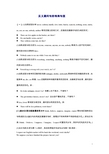
反义疑问句的特殊句型(一)(1)当陈述部分有never,seldom, hardly,few,little,barely, scarcely, nothing,none, rarely, no, not, no one, nobody, neither等否定意义的词汇时,后面的反意疑问句则为肯定形式:●There are few apples in the basket, are there?●He can hardly swim, can he?●They seldom come late, do they?(2)当陈述部分的主语为everyone, someone, anyone, no one, nobody等表示人的不定代词时,疑问部分的主语常用they:●Nobody came to see me while I was out, did they?(3)当陈述部分的主语为everything, something, anything, nothing等表示物的不定代词时,疑问部分的主语用it:●Something is wrong with your watch, isn’t it?(4)当陈述部分含有否定意思的词是unhappy, dislike, unfriendly,等含有否定词缀的派生词,也就是有un, dis-, no-前缀、less-后缀等含有词缀而意思否定的词,当做肯定句处理,疑问部分要用否定形式。
如:●He looks unhappy, doesn’t he? 他看上去不高兴,不是吗?●The girl dislikes history, doesn’t she? 这女孩不喜欢历史,不是吗?有less, fewer等词视为肯定词,疑问部分用否定形式。
如:●There will be less pollution, won't there?(二)表示主语主观意愿的词含有think, believe, suppose, imagine, expect等动词后接宾语从句构成的主从复合句在构成反意疑问句时,视情况不同有两种不同的构成方式。
反义疑问句句型归纳

反义疑问句句型归纳1、You had no time for reading, did you ? \ had you?2、He has a bro ther, hasn’t he, \ doesn’t he?3、We have to go without him, don’t we ?4、You have you r dinner at school, don’t you?5、He has a res t every two hours, doesn’t he?6、This is your last chance to learn from the beginning, isn’t it?7、Those were terrible days f or us to recall, weren’t they?8、There are some books you ar e interested in, aren’t there?9、Let us do it as we please \ like to, will you? \ can you?10、Let’s us do it right now, shall we? \ can we?11、Come here, will you? \ won’t you \ can you \ c an’t you \ do you \ don’t you?12、Don’t say anything, will you? \ can you? \ do you?13、Tom, you clean the window, will you?14、I think \ say \suppose \ guess \ am sure he will come back soon, won’t he?15、I don’t think he will come back , will he?16、He old man never thought he was lonely, did he?17、The old man used to be a f armer, usedn’t he \ didn’t he?18、He ought to come, oughtn’t he \ shouldn’t?19、He seldom goes to the cinema, doesn’t he?( hardly, never, few, little, nothing, nobody)20、It’s unfair, isn’t it?21、One can’t be car eful enough, can one \ can he?22、Eve rything goes well, doesn’t it?23、Everybody agrees with him, doesn’t he \ don’t they?24、All we needed has been bought, hasn’t it?25、All we invited have arrived, haven’t they?(All refers to people)26、Learning E nglish is very hard, isn’t it?27、He studies hard and he is often prai sed by his teachers, isn’t he?28、We must be more polite in this occasion, needn’t we?29、He m ust be a brave man, isn’t he?30、It must have rained last night, didn’t it?31、He mush hav e known the answer, hasn’t he?32、He can’t have done such a foolish thing, has he?33、I am a student, aren’t I ?34、So he has known the secret, has he?35、Oh, you have the same type of sell phone as I, do you?一、反意疑问句的意义及其构成反意疑问句又叫附加疑问句,是指当提问的人对前面所叙述的事实不敢肯定,而需要向对方加以证实时所提出的问句。
反义疑问句句型归纳

反义疑问句句型归纳-标准化文件发布号:(9556-EUATWK-MWUB-WUNN-INNUL-DDQTY-KII反义疑问句句型归纳1、You had no time for reading, did you\ had you?2、He has a bro ther, hasn’t he, \ doesn’t he?3、We have to go without him, don’t we4、You have you r dinner at school, don’t you?5、He has a res t every two hours, doesn’t he?6、This is your last chance to learn from the beginning, isn’t it?7、Those were terrible days f or us to recall, weren’t they?8、There are some books you ar e interested in, aren’t there?9、Let us do it as we please \ like to, will you \ can you10、Let’s us do it right now, shall we \ can we11、Come here, will you\ won’t you \ can you \ c an’t you \ do you \ don’t you?12、Don’t say anything, will you \ can you \ do you13、Tom, you clean the window, will you?14、I think \ say \suppose \ guess \ am sure he will come back soon, won’t he?15、I don’t think he will come back , will he?16、He old man never thought he was lonely, did he?17、The old man used to be a f armer, usedn’t he \ didn’t he?18、He ought to come, oughtn’t he \ shouldn’t?19、He seldom goes to the cin ema, doesn’t he?( hardly, never, few, little, nothing, nobody)20、It’s unfair, isn’t it?21、One can’t be car eful enough, can one \ can he?22、Eve rything goes well, doesn’t it?23、Everybody agrees with him, doesn’t he \ don’t they?24、All we needed has bee n bought, hasn’t it?25、All we invited have arrived, haven’t they(All refers to people)26、Learning E nglish is very hard, isn’t it?27、He studies hard and he is often prai sed by his teachers, isn’t he?28、We must be more polite in this occasion, needn’t w e?29、He must be a brave man, isn’t he?30、It must have rained last night, didn’t it?31、He mush hav e known the answer, hasn’t he?32、He can’t have done such a foolish thing, has he?33、I am a student, aren’t I34、So he has known the secret, has he?35、Oh, you have the same type of sell phone as I, do you一、反意疑问句的意义及其构成反意疑问句又叫附加疑问句,是指当提问的人对前面所叙述的事实不敢肯定,而需要向对方加以证实时所提出的问句。
反义疑问句的句型

反义疑问句的句型
1. 你知道“今天天气真好,不是吗?”这就是一个反义疑问句呀!比如大家一起出去玩,有人说“这地方真好玩啊”,然后接着来一句“不是吗”,是不是感觉很自然?
2. 难道你没听过“他很厉害,对吧?”这种句子吗?就像朋友在你面前展示一项技能,然后问你“我厉害吧,对吧?”。
3. “你应该会做饭,不是吗?”,这太常见啦!就像妈妈问孩子“你都这么大了,应该会做饭,不是吗?”。
4. 有没有觉得“那本书很有趣,不是吗?”这样的反义疑问句很亲切?比如在读书分享会上,有人推荐一本书后说“那本书真的很有趣,不是吗?”。
5. “你喜欢这部电影,对吧?”,哎呀,这不就是我们平时会说的嘛!像和朋友看完电影后会问“你喜欢这部电影,对吧?”。
6. “这件衣服很漂亮,不是吗?”多形象啊!比如在服装店试衣服,自己会说“这件衣服很漂亮,不是吗?”。
7. “你不会生气了吧,不是吗?”,这种时候常常会这么问呀!就像和朋友开玩笑后担心他生气,就会问一句“你不会生气了吧,不是吗?”。
8. “这个蛋糕很好吃,对吧?”,想想在吃蛋糕的时候,是不是很容易就说出这句话呢!
9. “他肯定能做好,不是吗?”,就好像对别人充满信心时会说“他那么厉害,肯定能做好,不是吗?”。
10. “你已经准备好了,对吧?”,比如要去参加一个活动,会问伙伴“你已经准备好了,对吧?”。
我的观点结论:反义疑问句在我们的日常交流中真的太常见啦,它能让对话更自然、更亲切,也能更好地表达我们的情感和态度。
英语反义疑问句24式

一、反意疑问句中问句部分的动词与陈述部分的动词在语气上成相反的对应关系,即:肯定+否定?否定+肯定?如:①You can’t do it, can you? ②They are very late for the meeting, aren’t they?二、反意疑问句中问句部分的动词与陈述部分的动词种类要对应一致。
如:①He has supper at home every day, doesn’t he? (不能用hasn’t he?)②They have known th e matter, haven’t they? (不能用don’t they?)三、反意疑问句中问句部分的动词在时态上应和陈述部分的时态一致。
如:①They will go to town soon, won’t they?(不能用don’t they?或aren’t they?)②He works very hard, doesn’t he?(不能用didn’t he?或won’t he?)四、反意疑问句的陈述部分含有由un-, im-, in-, dis-, 等否定意义的前缀构成的词语时,陈述部分要视为肯定含义,问句部分用否定形式。
如:①Your father is unhappy, isn’t he?(不能用is he?)②The man is dishonest, isn’t he? (不能用is he?)③It is impossible to learn English without remembering more words, isn’t it?(不能用is it ?)五、反意疑问句的陈述部分带有little, few, never, hardly, seldom等否定意义的词时,问句部分用肯定式。
如:①She never tells a lie, does she?(不用doesn’t she?)②He was seldom late, was he?(不用wasn’t he?)六、反意疑问句的陈述部分为I am…时,问句部分习惯上用aren’t I?表示。
反义疑问句讲解与练习

反义疑问句讲解与练习一、含be(is, are, was, were)动词的反意疑问句(1)句型1:主语+ be+其它,isn’t(aren’t, wasn’t, weren’t)+ 主语?句型2:主语+ be not+其它,is(are, was, were) + 主语?① You are from America, aren’t you? Yes, I am. No, I’m not.② It isn’t very cold today, is it? Yes, it is. No,it isn’t.(2)注意:There be句型例:There is an old picture on the wall, isn’t there?二、带行为动词反意疑问句(不含be和情态动词)句型1:主语+动词+其他,do/did/does + not +主语?句型2:主语+did/does/do+not +动词原形+其他,did/do/does+其他?例:You often watch TV in the evening, don’t you? Yes, I do. No, I don’t.三、含有情态动词的反意疑问句,反义疑问句中的动词使用情态动词。
例:The students must study hard, mustn’t they? Yes, they must. No, they needn’t.注意:You must go home now, needn’t you? Yes, I must. No, I needn’t.★注意:There be句型的一般将来时① There will be a basketball match tomorrow, won’t there?Yes, there will. No, there won’t.② There won’t be too much pollution in the future, will there?Yes, there will. No, there won’t.四、反义疑问句的回答:答语要和实际情况相符合,遵循“实事求是”的原则。
反义疑问句用法归纳
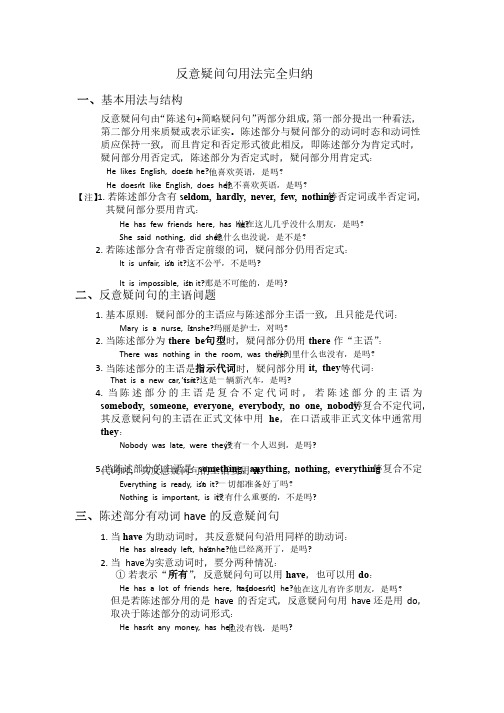
反意疑问句用法完全归纳 一、基本用法与结构 反意疑问句由“陈述句+简略疑问句”两部分组成,第一部分提出一种看法,第二部分用来质疑或表示证实。
陈述部分与疑问部分的动词时态和动词性质应保持一致,而且肯定和否定形式彼此相反,即陈述部分为肯定式时,疑问部分用否定式,陈述部分为否定式时,疑问部分用肯定式: He likes English, doesn’t he? 他喜欢英语,是吗?他喜欢英语,是吗? He doesn’t like English, does he? 他不喜欢英语,是吗? 【注】1. 若陈述部分含有seldom, hardly, never, few, nothing等否定词或半否定词,其疑问部分要用肯式: He has few friends here, has he? 他在这儿几乎没什么朋友,是吗? She said nothing, did she? 她什么也没说,是不是? 2. 若陈述部分含有带否定前缀的词,疑问部分仍用否定式: It is unfair, isn’t it? 这不公平,不是吗这不公平,不是吗? It is impossible, isn’t it? 那是不可能的,是吗那是不可能的,是吗? 反意疑问句的主语问题二、反意疑问句的主语问题1. 基本原则:疑问部分的主语应与陈述部分主语一致,且只能是代词: Mary is a nurse, isn’t she? 玛丽是护士,对吗?玛丽是护士,对吗? 2. 当陈述部分为there be句型时,疑问部分仍用there作“主语”: There was nothing in the room, was there? 房间里什么也没有,是吗? 3. 当陈述部分的主语是指示代词时,疑问部分用it, they等代词:’t it? 这是一辆新汽车,是吗 That is a new car, isn这是一辆新汽车,是吗? 4. 当陈述部分的主语是复合不定代词时,若陈述部分的主语为somebody, someone, everyone, everybody, no one, nobody等复合不定代词,其反意疑问句的主语在正式文体中用he,在口语或非正式文体中通常用they: Nobody was late, were they? 没有一个人迟到,是吗? 5.当陈述部分的主语是 something, anything, nothing, everything等复合不定代词时,其反意疑问句的主语要用it: Everything is ready, isn’t it? 一切都准备好了吗?一切都准备好了吗? Nothing is important, is it? 没有什么重要的,不是吗? 三、陈述部分有动词have的反意疑问句 1. 当have 为助动词时,其反意疑问句沿用同样的助动词: He has already le , hasn’t he? 他已经离开了,是吗他已经离开了,是吗? 2. 当 have 为实意动词时,要分两种情况:为实意动词时,要分两种情况: ①若表示“所有”,反意疑问句可以用have,也可以用do: He has a lot of friends here, hasn’t [doesn’t] he? 他在这儿有许多朋友,是吗?他在这儿有许多朋友,是吗? 但是若陈述部分用的是have的否定式,反意疑问句用have 还是用do,取决于陈述部分的动词形式: He hasn’t any money, has he? 他没有钱,是吗? He doesn ’t have any money, does he? 他没有钱,是吗? ② 若表示“吃”、“玩”等意思,反意疑问句要用do : He has supper at 5, doesn ’t he?他5点吃晚餐,是吗? He had a good me at the party, didn ’t he? 他在晚会上玩得很开心,是吗他在晚会上玩得很开心,是吗? 3. 当用于have to 时,通常也有两种可能:若表示经常性的行为,则多用加助动词do 的形式;若表示特定的行为,则多用have :He o en has to get up early, doesn ’t he? 他经常要早起,是吗他经常要早起,是吗? He has to go to bed late tonight, hasn ’t he? 他今晚要迟睡,是吗他今晚要迟睡,是吗? 四、含情态动词的反意疑问句 1. 基本原则:基本原则:在通常情况下,在通常情况下,在通常情况下,当陈述部分含有情态动词时,疑问部分会重复当陈述部分含有情态动词时,疑问部分会重复前面同样的情态动词: He can speak English, can ’t he ?他会说英语,是吗? We shouldn ’t go, should we? 我们不应该去,对不对?我们不应该去,对不对?2. 当陈述部分含有must 时,要分两种情况: ① 若must 表示“必须”或“有必要”,疑问部分用,疑问部分用mustn ’t 或needn ’t : You must leave at once, mustn ’t [needn ’t] you? 你必须你必须(有必要)马上离开,是吗? 但是若陈述部分有mustn mustn’’t 表示禁止,疑问部分要must : You mustn ’t laugh, must you? 你不准笑,知道吗? ② 若must 表示推测,疑问部分不能用must ,而应根据must 后的动词结构采用相应的动词形式:He must be red, isn ’t he? 他一定累了,是吗他一定累了,是吗? 五、陈述部分为祈使句的反意疑问句 1. 基本原则:若陈述部分为祈使句,疑问部分通常用will you :Please help us, will you? 请帮帮我们,好吗?请帮帮我们,好吗? Come with us, will you? 同我们一起去,好吗? Don Don’’t forget to post the le er, will you? 请别忘了寄信。
反义疑问句用法归纳

反意疑问句用法完全归纳一、基本用法与结构反意疑问句由“陈述句+简略疑问句”两部分组成,第一部分提出一种看法,第二部分用来质疑或表示证实。
陈述部分与疑问部分的动词时态和动词性质应保持一致,而且肯定和否定形式彼此相反,即陈述部分为肯定式时,疑问部分用否定式,陈述部分为否定式时,疑问部分用肯定式:He likes English, doesn’t he? 他喜欢英语,是吗?He doesn’t like English, does he? 他不喜欢英语,是吗?【注】1. 若陈述部分含有seldom, hardly, never, few, nothing等否定词或半否定词,其疑问部分要用肯式:He has few friends here, has he? 他在这儿几乎没什么朋友,是吗?She said nothing, did she? 她什么也没说,是不是?2. 若陈述部分含有带否定前缀的词,疑问部分仍用否定式:It is unfair, isn’t it? 这不公平,不是吗?It is impossible, isn’t it? 那是不可能的,是吗?二、反意疑问句的主语问题1. 基本原则:疑问部分的主语应与陈述部分主语一致,且只能是代词:Mary is a nurse, isn’t she? 玛丽是护士,对吗?2. 当陈述部分为there be句型时,疑问部分仍用there作“主语”:There was nothing in the room, was there? 房间里什么也没有,是吗?3. 当陈述部分的主语是指示代词时,疑问部分用it, they等代词:That is a new car, isn’t it? 这是一辆新汽车,是吗?4. 当陈述部分的主语是复合不定代词时,若陈述部分的主语为somebody, someone, everyone, everybody, no one, nobody等复合不定代词,其反意疑问句的主语在正式文体中用he,在口语或非正式文体中通常用they:Nobody was late, were they? 没有一个人迟到,是吗?5.当陈述部分的主语是 something, anything, nothing, everything等复合不定代词时,其反意疑问句的主语要用it:Everything is ready, isn’t it? 一切都准备好了吗?Nothing is important, is it? 没有什么重要的,不是吗?三、陈述部分有动词have的反意疑问句1. 当have 为助动词时,其反意疑问句沿用同样的助动词:He has already left, hasn’t he? 他已经离开了,是吗?2. 当 have 为实意动词时,要分两种情况:①若表示“所有”,反意疑问句可以用have,也可以用do:He has a lot of friends here, hasn’t [doesn’t] he? 他在这儿有许多朋友,是吗?但是若陈述部分用的是have的否定式,反意疑问句用have 还是用do,取决于陈述部分的动词形式:He hasn’t any money, has he? 他没有钱,是吗?He doesn’t have any money, does he? 他没有钱,是吗?②若表示“吃”、“玩”等意思,反意疑问句要用do:He has supper at 5, doesn’t he? 他5点吃晚餐,是吗?He had a good time at the party, didn’t he? 他在晚会上玩得很开心,是吗?3. 当用于have to时,通常也有两种可能:若表示经常性的行为,则多用加助动词do的形式;若表示特定的行为,则多用have:He often has to get up early, doesn’t he? 他经常要早起,是吗?He has to go to bed late tonight, hasn’t he? 他今晚要迟睡,是吗?四、含情态动词的反意疑问句1. 基本原则:在通常情况下,当陈述部分含有情态动词时,疑问部分会重复前面同样的情态动词:He can speak English, can’t he?他会说英语,是吗?We shouldn’t go, should we? 我们不应该去,对不对?2. 当陈述部分含有must时,要分两种情况:①若must表示“必须”或“有必要”,疑问部分用mustn’t或needn’t:You must leave at once, mustn’t [needn’t] you? 你必须(有必要)马上离开,是吗?但是若陈述部分有mustn’t表示禁止,疑问部分要must:You mustn’t laugh, must you? 你不准笑,知道吗?②若must表示推测,疑问部分不能用must,而应根据must后的动词结构采用相应的动词形式:He must be tired, isn’t he? 他一定累了,是吗?五、陈述部分为祈使句的反意疑问句1. 基本原则:若陈述部分为祈使句,疑问部分通常用will you:Please help us, will you? 请帮帮我们,好吗?Come with us, will you? 同我们一起去,好吗?Don’t forget to post the letter, will you? 请别忘了寄信。
(完整版)反义疑问句用法归纳
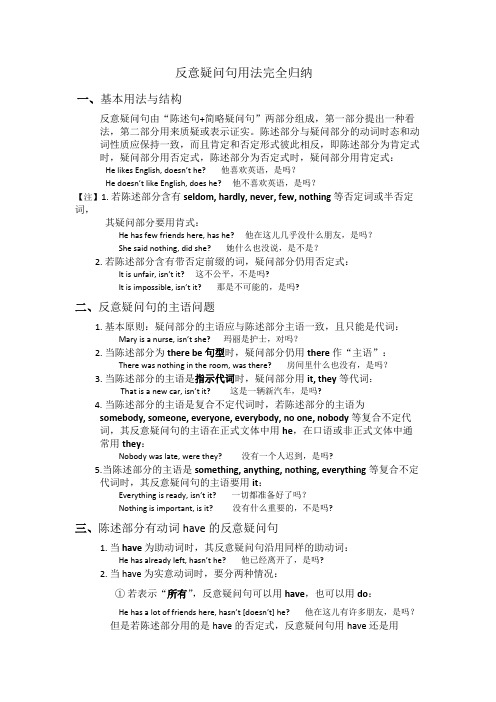
反意疑问句用法完全归纳一、基本用法与结构反意疑问句由“陈述句+简略疑问句”两部分组成,第一部分提出一种看法,第二部分用来质疑或表示证实。
陈述部分与疑问部分的动词时态和动词性质应保持一致,而且肯定和否定形式彼此相反,即陈述部分为肯定式时,疑问部分用否定式,陈述部分为否定式时,疑问部分用肯定式:He likes English, doesn’t he? 他喜欢英语,是吗?He doesn’t like English, does he? 他不喜欢英语,是吗?【注】1. 若陈述部分含有seldom, hardly, never, few, nothing等否定词或半否定词,其疑问部分要用肯式:He has few friends here, has he? 他在这儿几乎没什么朋友,是吗?She said nothing, did she? 她什么也没说,是不是?2. 若陈述部分含有带否定前缀的词,疑问部分仍用否定式:It is unfair, isn’t it? 这不公平,不是吗?It is impossible, isn’t it? 那是不可能的,是吗?二、反意疑问句的主语问题1. 基本原则:疑问部分的主语应与陈述部分主语一致,且只能是代词:Mary is a nurse, isn’t she? 玛丽是护士,对吗?2. 当陈述部分为there be句型时,疑问部分仍用there作“主语”:There was nothing in the room, was there? 房间里什么也没有,是吗?3. 当陈述部分的主语是指示代词时,疑问部分用it, they等代词:That is a new car, isn’t it? 这是一辆新汽车,是吗?4. 当陈述部分的主语是复合不定代词时,若陈述部分的主语为somebody, someone, everyone, everybody, no one, nobody等复合不定代词,其反意疑问句的主语在正式文体中用he,在口语或非正式文体中通常用they:Nobody was late, were they? 没有一个人迟到,是吗?5.当陈述部分的主语是 something, anything, nothing, everything等复合不定代词时,其反意疑问句的主语要用it:Everything is ready, isn’t it? 一切都准备好了吗?Nothing is important, is it? 没有什么重要的,不是吗?三、陈述部分有动词have的反意疑问句1. 当have 为助动词时,其反意疑问句沿用同样的助动词:He has already left, hasn’t he? 他已经离开了,是吗?2. 当 have 为实意动词时,要分两种情况:①若表示“所有”,反意疑问句可以用have,也可以用do:He has a lot of friends here, hasn’t [doesn’t] he? 他在这儿有许多朋友,是吗?但是若陈述部分用的是have的否定式,反意疑问句用have 还是用do,取决于陈述部分的动词形式:He hasn’t any money, has he? 他没有钱,是吗?He doesn’t have any money, does he? 他没有钱,是吗?②若表示“吃”、“玩”等意思,反意疑问句要用do:He has supper at 5, doesn’t he? 他5点吃晚餐,是吗?He had a good time at the party, didn’t he? 他在晚会上玩得很开心,是吗?3. 当用于have to时,通常也有两种可能:若表示经常性的行为,则多用加助动词do的形式;若表示特定的行为,则多用have:He often has to get up early, doesn’t he? 他经常要早起,是吗?He has to go to bed late tonight, hasn’t he? 他今晚要迟睡,是吗?四、含情态动词的反意疑问句1. 基本原则:在通常情况下,当陈述部分含有情态动词时,疑问部分会重复前面同样的情态动词:He can speak English, can’t he?他会说英语,是吗?We shouldn’t go, should we? 我们不应该去,对不对?2. 当陈述部分含有must时,要分两种情况:①若must表示“必须”或“有必要”,疑问部分用mustn’t或needn’t:You must leave at once, mustn’t [needn’t] you? 你必须(有必要)马上离开,是吗?但是若陈述部分有mustn’t表示禁止,疑问部分要must:You mustn’t laugh, must you? 你不准笑,知道吗?②若must表示推测,疑问部分不能用must,而应根据must后的动词结构采用相应的动词形式:He must be tired, isn’t he? 他一定累了,是吗?五、陈述部分为祈使句的反意疑问句1. 基本原则:若陈述部分为祈使句,疑问部分通常用will you:Please help us, will you? 请帮帮我们,好吗?Come with us, will you? 同我们一起去,好吗?Don’t forget to post the letter, will you? 请别忘了寄信。
(完整版)反义疑问句用法归纳
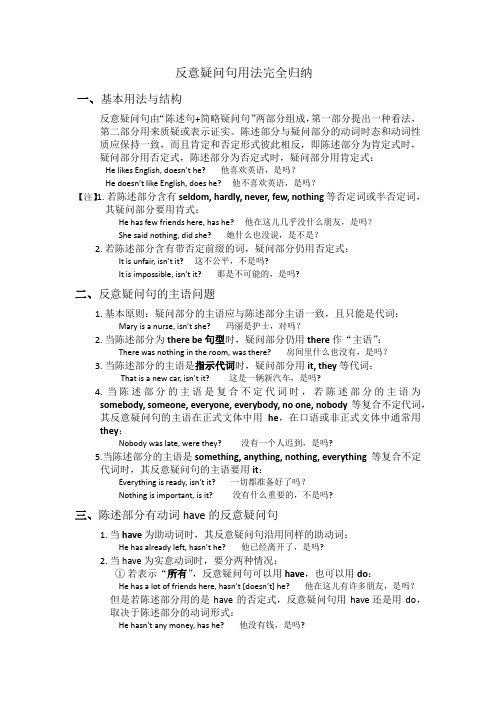
反意疑问句用法完全归纳一、基本用法与结构反意疑问句由“陈述句+简略疑问句”两部分组成,第一部分提出一种看法,第二部分用来质疑或表示证实。
陈述部分与疑问部分的动词时态和动词性质应保持一致,而且肯定和否定形式彼此相反,即陈述部分为肯定式时,疑问部分用否定式,陈述部分为否定式时,疑问部分用肯定式:He likes English,doesn’t he?他喜欢英语,是吗?He doesn’t like English,does he? 他不喜欢英语,是吗?【注】1.若陈述部分含有seldom,hardly,never,few,nothing等否定词或半否定词,其疑问部分要用肯式:He has few friends here,has he?他在这儿几乎没什么朋友,是吗?She said nothing,did she?她什么也没说,是不是?2.若陈述部分含有带否定前缀的词,疑问部分仍用否定式:It is unfair,isn’t it?这不公平,不是吗?It is impossible,isn’t it?那是不可能的,是吗?二、反意疑问句的主语问题1.基本原则:疑问部分的主语应与陈述部分主语一致,且只能是代词:Mary is a nurse,isn’t she? 玛丽是护士,对吗?2.当陈述部分为there be句型时,疑问部分仍用there作“主语”:There was nothing in the room,was there?房间里什么也没有,是吗?3.当陈述部分的主语是指示代词时,疑问部分用it,they等代词:That is a new car,isn’t it?这是一辆新汽车,是吗?4.当陈述部分的主语是复合不定代词时,若陈述部分的主语为somebody,someone,everyone,everybody,no one,nobody等复合不定代词,其反意疑问句的主语在正式文体中用he,在口语或非正式文体中通常用they:Nobody was late,were they?没有一个人迟到,是吗?5.当陈述部分的主语是something,anything,nothing,everything等复合不定代词时,其反意疑问句的主语要用it:Everything is ready,isn’t it? 一切都准备好了吗?Nothing is important,is it?没有什么重要的,不是吗?三、陈述部分有动词have的反意疑问句1.当have为助动词时,其反意疑问句沿用同样的助动词:He has already left,hasn’t he?他已经离开了,是吗?2.当have为实意动词时,要分两种情况:①若表示“所有”,反意疑问句可以用have,也可以用do:He has a lot of friends here,hasn’t[doesn’t]he?他在这儿有许多朋友,是吗?但是若陈述部分用的是have的否定式,反意疑问句用have还是用do,取决于陈述部分的动词形式:He hasn’t any money,has he?他没有钱,是吗?He doesn’t have any money,does he?他没有钱,是吗?②若表示“吃”、“玩”等意思,反意疑问句要用do:He has supper at5,doesn’t he? 他5点吃晚餐,是吗?He had a good time at the party,didn’t he?他在晚会上玩得很开心,是吗?3.当用于have to时,通常也有两种可能:若表示经常性的行为,则多用加助动词do的形式;若表示特定的行为,则多用have:He often has to get up early,doesn’t he?他经常要早起,是吗?He has to go to bed late tonight,hasn’t he?他今晚要迟睡,是吗?四、含情态动词的反意疑问句1.基本原则:在通常情况下,当陈述部分含有情态动词时,疑问部分会重复前面同样的情态动词:He can speak English,can’t he?他会说英语,是吗?We shouldn’t go,should we?我们不应该去,对不对?2.当陈述部分含有must时,要分两种情况:①若must表示“必须”或“有必要”,疑问部分用mustn’t或needn’t:You must leave at once,mustn’t[needn’t]you?你必须(有必要)马上离开,是吗?但是若陈述部分有mustn’t表示禁止,疑问部分要must:You mustn’t laugh,must you?你不准笑,知道吗?②若must表示推测,疑问部分不能用must,而应根据must后的动词结构采用相应的动词形式:He must be tired,isn’t he?他一定累了,是吗?五、陈述部分为祈使句的反意疑问句1.基本原则:若陈述部分为祈使句,疑问部分通常用will you:Please help us,will you?请帮帮我们,好吗?Come with us,will you?同我们一起去,好吗?Don’t forget to post the letter,will you?请别忘了寄信。
反义疑问句(最全)
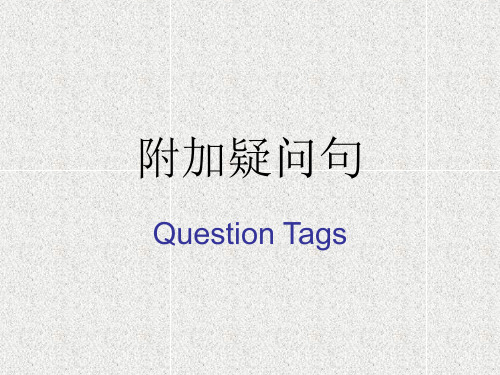
5.陈述部分有would rather +v.,疑问部分多用 wouldn’t +主语。 He would rather read it ten times than recite it, wouldn’t he? 6.陈述部分有you’d like to +v. 疑问部分用wouldn’t + 主语。 You’d like to go with me, wouldn’t you? 7.陈述部分是“there be”结构时,疑问部分用there省 略主语代词。 There is something wrong with your watch, isn't there? There will not be any trouble, will there? Note: 当为“ there used to be…”句型时,反意问句用 didn’t there。
b. 带有定语从句,宾语从句的主从复合句,疑问部分谓 语根据主句的谓语而定 He is not the man who gave us a talk, is he? He said he wanted to visit Japan, didn’t he?
c. 上述部分主句是由谓语think, believe, expect, suppose, imagine等引导的宾语从句,疑问部分与宾语 从句相对应构成bright, is he? We believe she can do it better, can't she? Note: 但此时主语必须是第一人称。如果不是,则不能否定从 句。 He thought she was wrong, didn't he? 而不能说wasn't she?
a 表示肯定推测 (一)句中陈述部分没有表示过去的时间状语,这时疑问 部分中的动词就用现在完成时。 (haven’t / hasn’t + 主语) You must have told her about it, haven’t you?
英语中反意疑问句的常见句型
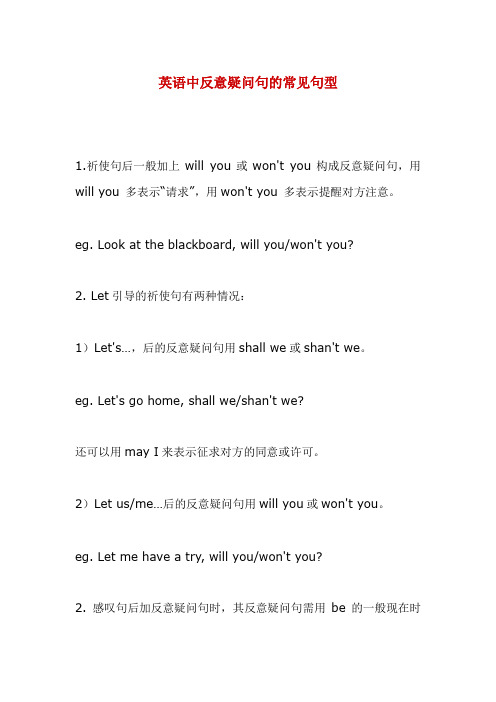
英语中反意疑问句的常见句型1.祈使句后一般加上will you或won't you构成反意疑问句,用will you 多表示“请求”,用won't you 多表示提醒对方注意。
eg. Look at the blackboard, will you/won't you?2. Let引导的祈使句有两种情况:1)Let's…,后的反意疑问句用shall we或shan't we。
eg. Let's go home, shall we/shan't we?还可以用may I来表示征求对方的同意或许可。
2)Let us/me…后的反意疑问句用will you或won't you。
eg. Let me have a try, will you/won't you?2. 感叹句后加反意疑问句时,其反意疑问句需用be的一般现在时态的否定形式。
What a lovely puppy, isn't it?3.当陈述部分谓语动词是need, dare, used to,且这些词被用作实义动词时,其反意疑问句需用do的适当形式。
eg. He needs help, doesn't he?4.陈述部分主、谓语是I am…时,反意疑问句用aren't I 或ain't I ,而不是am not I (可用am I not)。
I'm working at that time, ain't I?5.陈述部分的主语是不定代词one时,反意疑问句的主语可以用one,也可用you(美式英语用he)。
eg. One should be ready to face difficults of life, shouldn't one?6.当陈述部分含有以下这些含有否定意义的词时:few, little, seldom,hardly, never, not, no, no one, nobody, nothing,none, neither等,其反意疑问句需用肯定结构。
高中英语反义疑问句(详细)
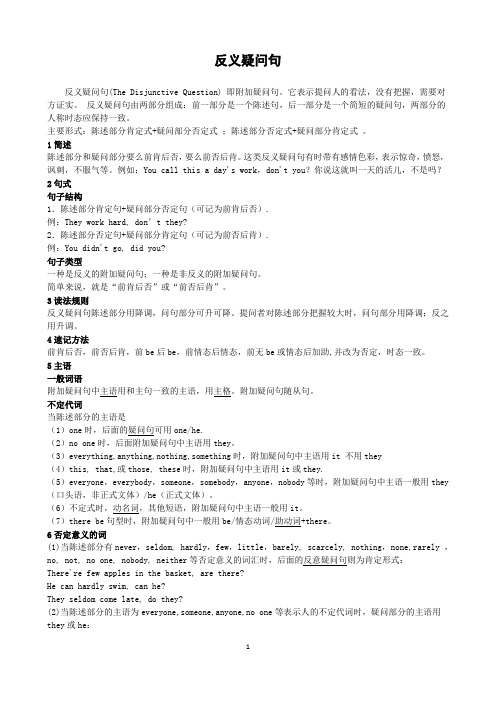
反义疑问句反义疑问句(The Disjunctive Question) 即附加疑问句。
它表示提问人的看法,没有把握,需要对方证实。
反义疑问句由两部分组成:前一部分是一个陈述句,后一部分是一个简短的疑问句,两部分的人称时态应保持一致。
主要形式:陈述部分肯定式+疑问部分否定式;陈述部分否定式+疑问部分肯定式。
1简述陈述部分和疑问部分要么前肯后否,要么前否后肯。
这类反义疑问句有时带有感情色彩,表示惊奇,愤怒,讽刺,不服气等。
例如:You call this a day's work,don't you?你说这就叫一天的活儿,不是吗?2句式句子结构1.陈述部分肯定句+疑问部分否定句(可记为前肯后否).例:They work hard, don’t they?2.陈述部分否定句+疑问部分肯定句(可记为前否后肯).例:You didn't go, did you?句子类型一种是反义的附加疑问句;一种是非反义的附加疑问句。
简单来说,就是“前肯后否”或“前否后肯”。
3读法规则反义疑问句陈述部分用降调,问句部分可升可降。
提问者对陈述部分把握较大时,问句部分用降调;反之用升调。
4速记方法前肯后否,前否后肯,前be后be,前情态后情态,前无be或情态后加助,并改为否定,时态一致。
5主语一般词语附加疑问句中主语用和主句一致的主语,用主格。
附加疑问句随从句。
不定代词当陈述部分的主语是(1)one时,后面的疑问句可用one/he.(2)no one时,后面附加疑问句中主语用they。
(3)everything,anything,nothing,something时,附加疑问句中主语用it 不用they(4)this, that,或those, these时,附加疑问句中主语用it或they.(5)everyone,everybody,someone,somebody,anyone,nobody等时,附加疑问句中主语一般用they (口头语,非正式文体)/he(正式文体)。
反义疑问句句型归纳
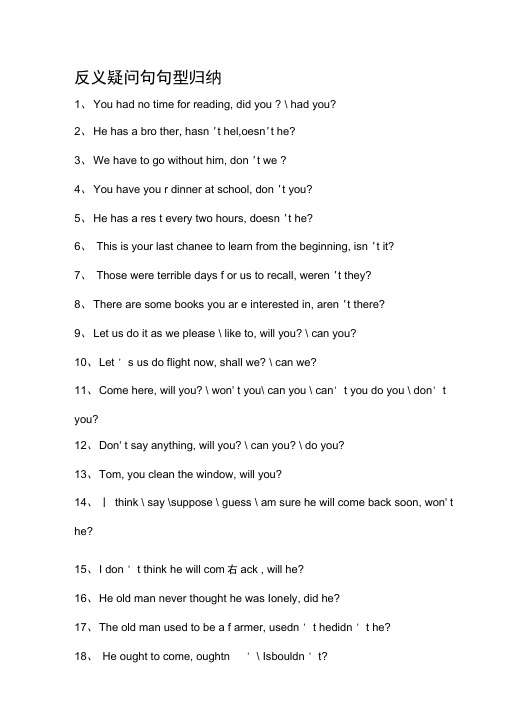
反义疑问句句型归纳1、You had no time for reading, did you ? \ had you?2、He has a bro ther, hasn ' t hel,oesn' t he?3、We have to go without him, don ' t we ?4、You have you r dinner at school, don ' t you?5、He has a res t every two hours, doesn ' t he?6、This is your last chanee to learn from the beginning, isn ' t it?7、Those were terrible days f or us to recall, weren ' t they?8、There are some books you ar e interested in, aren ' t there?9、Let us do it as we please \ like to, will you? \ can you?10、Let ' s us do flight now, shall we? \ can we?11、Come here, will you? \ won' t you\ can you \ can' t you do you \ don' t you?12、Don' t say anything, will you? \ can you? \ do you?13、Tom, you clean the window, will you?14、丨think \ say \suppose \ guess \ am sure he will come back soon, won' t he?15、I don ' t think he will com右ack , will he?16、He old man never thought he was Ionely, did he?17、The old man used to be a f armer, usedn ' t hedidn ' t he?18、He ought to come, oughtn ' \ Isbouldn ' t?19、He seldom goes to the cinema, doesn ' t he?... .c(hardly, n ever, few, little, nothing, n obody)20、It ' s unfair, isn ' t it?21、One can ' t be caeful eno ugh, can one \ can he?22、Everything goes well, doesn ' t it?23、Everybody agrees with him, doesn ' t hedon' t they?24、All we needed has been bought, hasn' t it?25、All we invited have arrived, haven ' t they?(AII refers to people)26、Learning E nglish is very hard, isn ' t it?27、He studies hard and he is often prai sed by his teachers, isn ' t he?28、We must be more polite in this occasion, needn ' t we?29、He m ust be a brave man, isn ' t he?30、It must have rained last night, didn ' t it?31、He mush hav e known the answer, hasn ' t he?32、He can ' t have donesuch a foolish thing, has he?33、I am a student, aren ' t I ?34、So he has known the secret, has he?35、Oh, you have the same type of sell phone as I, do you?一、反意疑问句的意义及其构成反意疑问句又叫附加疑问句,是指当提问的人对前面所叙述的事实不敢肯定,而需要向对方加以证实时所提出的问句。
(完整版)反义疑问句用法归纳
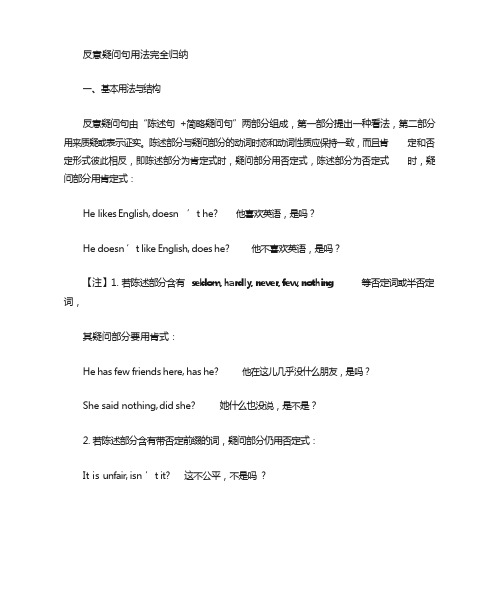
反意疑问句用法完全归纳一、基本用法与结构反意疑问句由“陈述句+简略疑问句”两部分组成,第一部分提出一种看法,第二部分用来质疑或表示证实。
陈述部分与疑问部分的动词时态和动词性质应保持一致,而且肯定和否定形式彼此相反,即陈述部分为肯定式时,疑问部分用否定式,陈述部分为否定式时,疑问部分用肯定式:He likes English, doesn ’t he? 他喜欢英语,是吗?He doesn ’t like English, does he? 他不喜欢英语,是吗?【注】1. 若陈述部分含有seldom, hardly, never, few, nothing 等否定词或半否定词,其疑问部分要用肯式:He has few friends here, has he? 他在这儿几乎没什么朋友,是吗?She said nothing, did she? 她什么也没说,是不是?2. 若陈述部分含有带否定前缀的词,疑问部分仍用否定式:It is unfair, isn ’t it? 这不公平,不是吗?It is impossible, isn ’t it? 那是不可能的,是吗 ?二、反意疑问句的主语问题1.基本原则:疑问部分的主语应与陈述部分主语一致,且只能是代词:Mary is a nurse, isn’t she? 玛丽是护士,对吗?2.当陈述部分为there be 句型时,疑问部分仍用there 作“主语”:There was nothing in the room, was there? 房间里什么也没有,是吗?3.当陈述部分的主语是指示代词时,疑问部分用it, they 等代词:That is a new car, isn ’t it? 这是一辆新汽车,是吗?4.当陈述部分的主语是复合不定代词时,若陈述部分的主语为somebody, someone, everyone, everybody, no one, nobody 等复合不定代词,其反意疑问句的主语在正式文体中用he ,在口语或非正式文体中通常用they :Nobody was late, were they? 没有一个人迟到,是吗 ?5.当陈述部分的主语是something, anything, nothing, everything 等复合不定代词时,其反意疑问句的主语要用it:Everything is ready, isn ’t it? 一切都准备好了吗?Nothing is important, is it? 没有什么重要的,不是吗 ?三、陈述部分有动词 have 的反意疑问句1.当have 为助动词时,其反意疑问句沿用同样的助动词:He has already left, hasn ’t he? 他已经离开了,是吗 ?2.当 have 为实意动词时,要分两种情况:①若表示“所有”,反意疑问句可以用h ave,也可以用do:He has a lot of friends here, hasn ’t [doesn ’t] he? 他在这儿有许多朋友,是吗?但是若陈述部分用的是have 的否定式,反意疑问句用have 还是用 do,取决于陈述部分的动词形式:He hasn ’t any money, has he? 他没有钱,是吗 ?He doesn ’t have any money, does he? 他没有钱,是吗 ?②若表示“吃”、“玩”等意思,反意疑问句要用do:He has supper at 5, doesn ’t he? 他 5 点吃晚餐,是吗 ?He had a good time at the party, didn ’t he? 他在晚会上玩得很开心,是吗 ?3.当用于have to 时,通常也有两种可能:若表示经常性的行为,则多用加助动词do 的形式;若表示特定的行为,则多用have :He often has to get up early, doesn ’t he? 他经常要早起,是吗?He has to go to bed late tonight, hasn ’t he? 他今晚要迟睡,是吗 ?四、含情态动词的反意疑问句1.基本原则:在通常情况下,当陈述部分含有情态动词时,疑问部分会重复前面同样的情态动词:He can speak English, can ’t he ?他会说英语,是吗?Weshouldn ’t go, s hould we? 我们不应该去,对不对?2.当陈述部分含有must 时,要分两种情况:①若must表示“必须”或“有必要”,疑问部分用mustn’t或needn’t:Y ou must leave at once, mustn ’t [needn ’t] you? 你必须(有必要) 马上离开,是吗 ?但是若陈述部分有 mustn ’t 表示禁止,疑问部分要must :Y ou mustn ’t laugh, must you? 你不准笑,知道吗 ?② 若 must 表示推测,疑问部分不能用 must ,而应根据 must 后的动词结构采用相应的动词形式:He must be tired, isn ’t he? 他一定累了,是吗 ?五、陈述部分为祈使句的反意疑问句1.基本原则:若陈述部分为祈使句,疑问部分通常用will you :Please help us, will you? 请帮帮我们,好吗?Come with us, will you? 同我们一起去,好吗?Don’t forget to p ost the le t t er, will you? 请别忘了寄信。
反义疑问句

反义疑问句的12种特殊句型1.在由祈使句+疑问部分构成的反义疑问句中,疑问部分通常用will you, won’t you, would you,有时也可以用can you , can’t you, why don’t you, could you等,但不用do,即使祈使句中有助动词do 时也是这样,Pass me the dictionary, will (would)you?Don’t do that again, will you?在含有let的祈使句后的反义疑问句部分,如果let 的宾语us包括听者(常写为let’s)时用shall we,不包括听者(常写为let us)时用will you. Let的宾语是me时,要根据意思用will you或may I 。
let 的宾语是第三人称时用will you .Let him speak first,will you ?2.当陈述部分带有情态动词must 时,反义疑问部分要根据Must的意思不同而有所变化。
如果must 表示必须,有必要时,反义疑问部分用musn’t 或neen’t .如I must hand in my exercise book now,must’t I (needn’t I )?如果must n’t 表示禁止时,疑问部分一般用mustYou mustn’t take the magazine out of the reading room,must you ?若must 表示想必,一定等推测意义时,则疑问部分不用must,而要根据must 之后的动词结构及含义使用相应的动词形式。
如:He must be your English teacher, isn’t he ?Chinese must have the largest number of speakers, doesn’t it ?You must have read read the book yesterday , didn’t he?3.当陈述部分的主语为nothing , anything, everything等不定代词时,反义疑问部分主语用it ,如:Nothing could prevent him from going there, could it?如果陈述部分的主语为nobody,somebody,none,someone,no one,anyone,anybody,everyone等不定代词,反义疑问部分主语用they 或he,如:Somebody took my umbrella away yesterday, didn’t they/he ?4.当陈述部分带有that从句作宾语时,反义疑问部分应与主句的主语和谓语一致。
反义疑问句用法归纳完整版

反义疑问句用法归纳一、基本用法与结构?反意疑问句由“陈述句+简略疑问句”两部分组成,第一部分提出一种看法,第二部分用来质疑或表示证实。
陈述部分与疑问部分的动词时态和动词性质应保持一致,而且肯定和否定形式彼此相反,即陈述部分为肯定式时,疑问部分用否定式, 陈述部分为否定式时,疑问部分用肯定式:HelikesEnglish, doesn, the他喜欢英语,是吗?He?doesn,tlikeEnglish, doeshe 他不喜欢英语,是吗【注】1.若陈述部分含有seldom, hardly, never, few, nothing等否定词或半否定词,其疑问部分要用肯式:Hehasfewfriendshere, hashe他在这儿儿乎没什么朋友,是吗?Shesaidnothing, didshe 她什么也没说,是不是?2•若陈述部分含有带否定前缀的词,疑问部分仍用否定式:Itisunfair,isn' tit这不公平,不是吗?Itisimpossible, isn" tit那是不可能的,是吗?二、反意疑问句的主语问题?1.基本原则:疑问部分的主语应与陈述部分主语一致,且只能是代词:Maryisanurse, isn" t she?玛丽是护士,对吗?2.当陈述部分为there?be句型时,疑问部分仍用there作“主语”:Therewasnothingintheroom, wasthere 房间里什么也没有,是吗?3.当陈述部分的主语是指示代词时,疑问部分用it,they等代词:Thatisanewcar, isn' tit这是一辆新汽车,是吗?4.当陈述部分的主语是复合不定代词时,若陈述部分的主语为somebody, someone, everyone, everybody, noone, nobody 等复合不定代词,其反意疑问句的主语在正式文体中用he,在口语或非正式文体中通常用they:Nobod^-aslate, werethey 没有一个人迟到,是吗?5.当陈述部分的主语是something, anything, nothing, everything等复合不定代词时,其反意疑问句的主语要用it:Everythingisready,isn' tit一切都准备好了吗Nothingisimportant, isit 没有什么重要的,不是吗?三、陈述部分有动词have的反意疑问句?1.当have?为助动词时,其反意疑问句沿用同样的助动词:Hehasalreadyleft, hasn' the 他已经离开了,是吗?2 .当have为实意动词时,要分两种情况:①若表示“所有”,反意疑问句可以用have,也可以用do:Hehasalotoffriendshere, hasn' t[doesn' t]he 他在这儿有许多朋友,是吗?但是若陈述部分用的是have的否定式,反意:疑问句用have?还是用do,取决于陈述部分的动词形式:He?doesn? thaveanymoney, doeshe 他没有钱,是吗②若表示“吃”、“玩”等意思,反意疑问句要用do:Hehassupperat5, doesn' the 他 5 点吃晚餐,是吗?Hehadagoodtimeattheparty, didn' the 他在晚会上玩得很开心,是吗3.当用于have?to时,通常也有两种可能:若表示经常性的行为,则多用加助动词do的形式;若表示特定的行为,则多用have:He?oftenhastogetupearly, doesn' the 他经常要早起,是吗?Hehastogotobedlatetonight, hasn* the 他今晚要迟睡,是吗?四、含情态动词的反意疑问句?1 •基本原则:在通常情况下,当陈述部分含有情态动词时,疑问部分会重复前面同样的情态动词:HecanspeakEnglish, can* the 他会说英语,是吗?2.当陈述部分含有must时,要分两种情况:①若must表示“必须”或“有必要”,疑问部分用?mustn, t或needn' t:Youmustleaveatonce, mustn* t[needn1 tlyou 你必须(有必要)马上离开,是吗?但是若陈述部分有mustn* t表示禁止,疑问部分要must:You?mustn' tlaugh, mustyou 你不准笑,知道吗?②若must表示推测,疑问部分不能用must,而应根据must后的动词结构采用相应的动词形式:Hemustbetired, isn" the 他一定累了,是吗?五、陈述部分为祈使句的反意疑问句?1 •基本原则:若陈述部分为祈使句,疑问部分通常用叭1 l?you:Pleasehelpus, willyou 请帮帮我们,好吗?Comewithus, willyou 同我们一起去,好吗?Don' tforgettoposttheletter, willyou 请别忘了寄信。
- 1、下载文档前请自行甄别文档内容的完整性,平台不提供额外的编辑、内容补充、找答案等附加服务。
- 2、"仅部分预览"的文档,不可在线预览部分如存在完整性等问题,可反馈申请退款(可完整预览的文档不适用该条件!)。
- 3、如文档侵犯您的权益,请联系客服反馈,我们会尽快为您处理(人工客服工作时间:9:00-18:30)。
反义疑问句句型归纳1、You had no time for reading, did you ? \ had you?2、He has a bro ther, hasn ' t hel,oesn' t he?3、We have to go without him, don ' t we ?4、You have you r dinner at school, don ' t you?5、He has a res t every two hours, doesn ' t he?6、This is your last chanee to learn from the beginning, isn ' t it?7、Those were terrible days f or us to recall, weren ' t they?8、There are some books you ar e interested in, aren ' t there?9、Let us do it as we please \ like to, will you? \ can you?10、Let ' s us do flight now, shall we? \ can we?11、Come here, will you? \ won' t you\ can you \ can' t you do you \ don' t you?12、Don' t say anything, will you? \ can you? \ do you?13、Tom, you clean the window, will you?14、丨think \ say \suppose \ guess \ am sure he will come back soon, won' t he?15、I don ' t think he will com右ack , will he?16、He old man never thought he was Ionely, did he?17、The old man used to be a f armer, usedn ' t hedidn ' t he?18、He ought to come, oughtn ' \ Isbouldn ' t?19、He seldom goes to the cinema, doesn ' t he?(hardly, n ever, few, little, nothing, n obody)20、It ' s unfair, isn ' t it?21、One can ' t be caeful eno ugh, can one \ can he?22、Everything goes well, doesn ' t it?23、Everybody agrees with him, doesn ' t hedon' t they?24、All we needed has been bought, hasn' t it?25、All we invited have arrived, haven ' t they?(AII refers to people)26、Learning E nglish is very hard, isn ' t it?27、He studies hard and he is often prai sed by his teachers, isn ' t he?28、We must be more polite in this occasion, needn ' t we?29、He m ust be a brave man, isn ' t he?30、It must have rained last night, didn ' t it?31、He mush hav e known the answer, hasn ' t he?32、He can ' t have donesuch a foolish thing, has he?33、I am a student, aren ' t I ?34、So he has known the secret, has he?35、Oh, you have the same type of sell phone as I, do you?一、反意疑问句的意义及其构成反意疑问句又叫附加疑问句,是指当提问的人对前面所叙述的事实不敢肯定,而需要向对方加以证实时所提出的问句。
其结构为:前一部分是一个陈述句,后一部分是一个简单的问句。
完成后一部分简单问句时,要根据前面陈述句的动词时态和人称来选择适当的助动词进行提问,前后两部分的人称和动词时态要保持一致。
如果前一部分用肯定式,后一部分一般用否定式;反之,前一部分为否定式,后一部分要用肯定式,即前肯定后否定,前否定后肯定”。
例You have been to Beijing, haven ' t yOU去过北京,是吗?二、简单句式结构中反意疑问句的运用反意疑问句运用于简单句式结构中时,应注意掌握以下几个方面1、当陈述句部分的主语是名词时,反意疑问句的主语必须用人称代词来代替。
例Your brother has gone to the library, hasn ' t he?你弟弟去图书馆了,是吗?2、当陈述句的主语是指示代词this, that时,反意疑问句的主语用it 代替;指示代词是these, those时,反意疑问句的主语用they代替。
例That isn ' t a useful book, is it?那不是一本有用的书,是吗?These are important reading materials, aren ' t they?这些都是重要的阅读材料,是吗?3、当陈述句部分是lam…时,反意疑问句部分通常要用aren ' tI如陈述句部分的主语是lam not时,反意疑问句部分通常要用am I。
例I ' m late for themeeting, aren ' t I我开会迟到了,是吗?I ' m not doing well, am I?我干得不好,是吗?4、当陈述部分是every one / everybody, some one / somebody, noone / nobody, none等表示人的不定代词时,反意疑问句部分的主语多用they,但也可用he;当陈述部分的主语是everything, anything, something, nothing等表示物的不定代词时,反意疑问句部分的主语用it。
例Nobody came when I was out, did they?我在外时,没人来过,是吗?Everything has gone wrong today, hasn ' t it?今天什么都出问题了,是不是?5、当陈述部分是“ there be +主语+其它”结构时,反意疑问部分要用“ be (not) + there 结构。
例There are some bananas in the basket, aren ' t there?篮子里有些香蕉,是吗?6、当陈述部分的谓语动词是have时,有两种情况。
1) have作有”解时,反意疑问句部分可用have (not)或do(not) 的相应形式。
例His brother has a new bike, hasn ' t (doesn ' t) he?他弟弟有一辆新自行车,是吗?2) have用作实义动词时,反意疑问句部分只可用do (not)的相应形式。
例We have to start early, don ' t我们必须早点出发,是吗?7、当陈述部分有hardly, scarcely, barely, rarely, seldom, few, little,no, n ever, no thi ng, no body, no where 等否定词或半否定词时,反意疑问句部分要用肯定形式。
注如果陈述句部分是带有否定前缀或后缀时,反意疑问句部分仍用否定结构。
例It ' s impossible for him to make such a mistake, isn 他不可?能犯这样的错误,是吗?&当陈述部分有情态动词ought to时,反意疑问句部分要用ought / should (ought n' t / shouldn ;如陈述部分为情态动词used to,反意疑问部分可用used或did ;如陈述部分为had better,反意疑问部分用had n't should n '。
例Such things ought not to be allowed, ought they? 这种事是不允许的,是吗?You' d better do it by yourself, hadn ' t / shouldn ' 你最l好自己做,好吗?9、当陈述句部分有情态动词must时,反意疑问部分有四种情况(1)must表示必须、禁止时,反意疑问部分要用must (mustn ' t)。
例You mustn' t stop your car here, must you?你不能把车停在这地方,知道吗?(2)must表示有必要”时,反意疑问句部分要用needn‘。
例They must finish the work today, needn ' t they?他们今天必须要完成这项工作,是吗?(3)当must用来表示对现在的情况进行推测”时,反意疑问部分要根据must后面的动词采用相应的形式。
例He must be good at maths, isn ' t he?他数学一定学得很好,是吗?(4)当must用来表示对过去的情况进行推测”(must + have done)时,如强调对过去情况的推测(一般句中有过去的时间状语) ,反意疑问句部分要用“didn ' t主语”如果强调动作的完成(一般没有过去时间状语),反意疑问句部分要用“haven' t / hasn主语”例She must have read the novel last wee k, didn ' t she?她上星期一定读了这本小说了,是吗?You must have told her about it, haven ' t you?你一定把这事告诉她了,是吗?10、当陈述部分的谓语动词是表示愿望的wish时,反意疑问部分要用may,而且前后两个部分均用肯定式。
